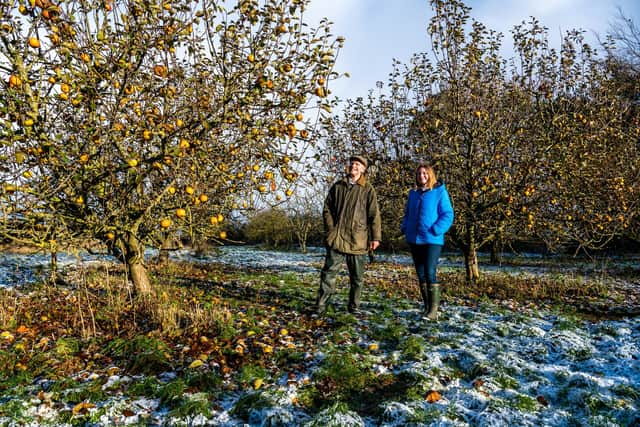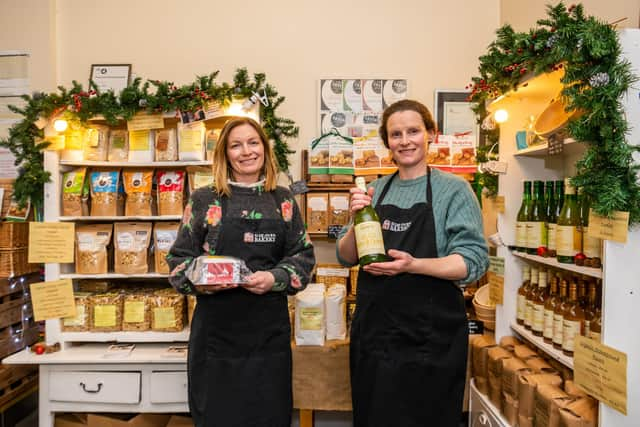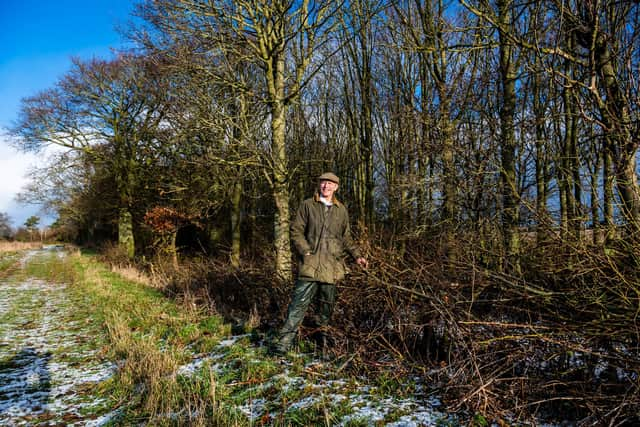Farm of the Week: Family who went organic in 1999 and now run Side Oven Bakery producing their own bread and juices
Caroline Sellers founded the farm’s bakery business in 2003 following her attendance at a breadmaking course, but it is the mueslis, granolas and porridges that have made their name and it was their organic granola with chocolate, orange and almond under the indulgent moniker that gave Side Oven their latest Deliciouslyorkshire Taste Award.
Husband and wife Tim and Caroline Sellers made the decision to go organic across their near-500 acre farm a quarter of a century ago when concern for healthier diets and care for the environment were starting to gather momentum. In the past decade, the sixth generation, daughters Hester and Jessica have returned to the farm making it even more a family enterprise.
Advertisement
Hide AdAdvertisement
Hide AdHester said she had moved back to the Wolds from a career in food down in London seven years ago after Jessica had returned a few years prior and that they are both aware of future possibilities for the farm and bakery’s ongoing success.


“Jessica is predominantly involved in the bakery with mum and I’m more on the farm side with dad.
“It is a challenging time at the moment with the phasing out of the BPS and the way in which farming is changing. We’ve had lots of conversations about adding even greater value.
“We already have several special events every year when we attract visitors to the farm. We host open days at least once a quarter, we have nature trails, apple picking days, blackcurrant picking days and themed walks. Our first winter wildlife walk and open day of 2023 will be held in conjunction with Yorkshire Wildlife Trust on Sunday 5 February.
Advertisement
Hide AdAdvertisement
Hide Ad“We are involved in countryside stewardship and the new Sustainable Farming Incentive. We undertake a lot of wildlife management, including wildflower strips, we have extensive hedges and hedge management. We have lovely woodland, an SSSI waterway Foston Beck is a tributary to the River Hull and runs through the farm. It all goes hand-in-hand with being an organic farm supporting and working with nature.


“We also have the bakery open. Jessica and I think that bringing people on to the farm is where we feel our future opportunities are because this is such a different farm.
“Being able to see our crops in the field and then to see what they go towards making in the bakery makes it a very real experience and we are able to explain what we do and why. Our apple orchard and soft fruits add to our offering with a range of juices and this year we launched apple and quince juice alongside others such as elderflower cordial, blackcurrant cordial and lemon and ginger cordial. We are trying to develop new produce all the time.
The latest organic market report from The Soil Association earlier this year recorded a tenth consecutive year of growth of organic food consumption, with an increase of 5.2 per cent in 2021 and a predicted increase of 6 per cent this year. The annual organic food market is now worth over £3 billion per year in the UK.
Advertisement
Hide AdAdvertisement
Hide AdThe ongoing rise has been put down to increasing public awareness over health and greater emphasis on the natural environment.


Hester said that her parents’ decision to go organic over twenty years ago has been vindicated and they are now part of a growing niche market that includes crop varieties that go back in time and also provide health benefits, such as spelt wheat that Carr House was one of the first farms to reintroduce around a decade ago and Einkorn wheat more recently.
“Farming organically, put very simply for us, means we grow cereal crops without the use of any manufactured inputs such as pesticides, herbicides and fertilisers. This doesn’t just give environmental benefits for the soil condition and a flourishing wildlife. It also means the land is back suited to ancient, primitive and heritage grains like spelt wheat and Einkorn that can better meet some people’s dietary needs.
“The gluten in spelt and Einkorn is more water soluble. For some who have gluten intolerance they find they can tolerate spelt-made and Einkorn-made bread more than they would a normal wheat-made bread.
Advertisement
Hide AdAdvertisement
Hide Ad“Spelt in the field looks very different to a modern-day wheat. It is much taller. It is a primitive grain that has not been messed about with. There is talk of it having been called a Roman marching grain.
“When the spelt is harvested it has a protective husk on it. We put it through a machine that takes off the husk. This adds an additional price for the extra work involved, which is why it’s not mainstream, but it is an increasingly popular grain for its bread making and health properties.
“We started growing Einkorn a few years ago. We mill it and sell the flour and quite a few artisan bakeries enjoy it for making sourdough.
“We grow wheat, oats, for the breakfast cereals, and cover crops which are the fertility breeding crops of vetch and clover. We use them for nitrogen fixing.
Advertisement
Hide AdAdvertisement
Hide AdCaroline had started baking bread in the farmhouse kitchen at Carr House, using a traditional side oven that had been used for breadmaking throughout each of the Sellers’ generations at the farm, but it was a trip to Germany that brought about the traditional stoneground mill used today in farm buildings that now house the mill, bakery and juicery.
Hester said it was this move to their own mill that had added the value to their wheat nearly twenty years ago.
“We mill ourselves, we make our own flour and our own bread and that is a real value-add. Our carr land is heavy and is adept at growing high-quality milling wheat, which made the mill such a great option for us.
While Side Oven Bakery continues to go from strength-to-strength Hester said the lion’s share of what is grown is still traded on the open market.
Advertisement
Hide AdAdvertisement
Hide Ad“Most of what we grow is sold off-farm. We sell into grain traders predominantly, although we do also sell some of our wheat to another local miller in Yorkshire who is looking for the heritage wheat we produce.
Hester and Jessica now have young families of their own, bringing a seventh generation to the farm. Hester has two young children and Jessica is expecting her second child imminently.
“We are both aware of the limitations that we have at times because of our responsibilities to our young families but together with mum and dad and the one full-time worker we employ on the farm and others in the bakery we have a strong team here at Carr House Farm and we are constantly looking at how we can improve the business moving forward.
“People are thinking about their diet, their health and the environment far more and we are delighted to be in a position to help in what we produce and what we offer.